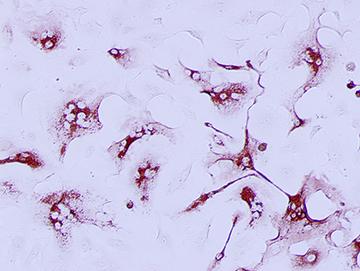
Credit: Stony Brook University
The News in Brief:
- SARS-CoV-2 likely activates endothelial cell responses in patients which contributes to serious lung symptoms, vascular obstruction and respiratory distress with Covid-19.
- A study shows that endothelial cells which line capillaries lack ACE2 receptors for SARS-CoV-2 attachment and suggests that SARS-CoV-2 indirectly activates endothelial cell linked disease mechanisms that direct coagulation and inflammation associated with severe Covid-19 disease.
- As a result, endothelial cell activation and SARS-CoV-2 induced endothelial cell responses may be potential therapeutic targets to help resolve Covid-19 disease.
STONY BROOK, NY, December 14, 2020 – For Covid-19 patients with serious lung disease, targeting endothelial cells -cells that comprise the blood vessel wall which regulate oxygen exchange between airways and the bloodstream- may be a novel approach restoring normal lung function. This hypothesis stems from a study by researchers in the Department of Microbiology and Immunology in the Renaissance School of Medicine at Stony Brook University and published in mBio, the leading journal for the American Society for Microbiology.
SARS-CoV-2 causes Covid-19, characterized by pulmonary edema, viral pneumonia, coagulopathy, inflammation and other physiological abnormalities. SARS-CoV-2 uses angiotensin-converting enzyme 2 (ACE2) receptors to infect and damage ciliated epithelial vascular cells in the upper respiratory tract. Yet how SARS2 dysregulates vascular functions causing an acute respiratory distress syndrome (ARDS) in Covid-19 patients remains an enigma.
Led by Erich Mackow, PhD, a Professor of Microbiology and Immunology, the team of scientists sought to unravel this mechanism by investigating SARS-CoV-2 infection of human endothelial cells from the lung, brain, heart and kidney that are impacted in COVID-19 patients.
“Claims that endothelial cells are infected by SARS-CoV-2 through ACE2 receptors have never been assessed directly,” said Mackow. “Our research revealed that endothelial cells lack ACE2 receptors and that endothelial cells were only SARS-CoV-2 infected after expressing ACE2 receptors in them. Since endothelial cell functions are dysregualted by SARS-CoV-2, these findings suggest a novel mechanism of regulation that does not require viral infection. Instead it suggests the indirect activation of the endothelium, potentially resulting from surrounding tissue damage, that could be the basis for further research to therapeutically target and restore normal endothelial cell responses.”
Mackow adds that their work centers on both endothelial cells and ACE2 functions in Covid-19 disease to identify mechanisms of capillary inflammation and aberrant clotting within vessels. He explains that the research reveals a novel mechanism of clotting and endothelial inflammation observed in the lung and heart of COVID-19 patients.
“A transformative change in the mechanism of endothelial cell dysfunction, not the infection of the cells themselves, changes the way in which disease is initiated and rationales for therapeutic targeting. If endothelial cells are not infected or directly damaged, they can still direct inflammation and clotting by just being activated,” he concludes from the research findings.
The team is working on how endothelial cells can be activated by the virus or in response to other SARS-CoV-2 infected lung cells that express ACE2.
The research suggests the potential to therapeutically target activation, rather than infection of the endothelium, as a strategy for resolving coagulation and inflammatory Covid-19 symptoms.
Mackow emphasizes that additional research of endothelial cells and down-regulated ACE2 functions following SARS-CoV-2 infection are necessary to determine targets that could lead to a reduction in respiratory distress and symptoms of Covid-19 patients.
###
The research is supported by a seed grant from Stony Brook University, along with additional funding from the Mathers Foundation, and the National Institutes of Health’s National Institute of Allergy and Infectious Diseases (NIAID): grant numbers RO1AI12901004, R21AI13173902, and R21AI15237201.
Media Contact
Greg Filiano
[email protected]




